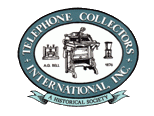
Telephone Collectors International
How Did the Steel Magnet Get Such a Pull?
Last update May 14, 2015
 | Telephone Collectors InternationalHow Did the Steel Magnet Get Such a Pull? | First Posted Apr 1, 2001 Last update May 14, 2015 |
Our Tribute to the Engineering and Science of the Bell System
April 1, 2001
A quote from A History of Engineering and Science in the Bell System - The Early Years is appropriate to set the stage for this 2001 April Fool's offering:
Magnetic materials have played a vital role in the Bell System almost from the beginning, and research on these materials was actively pursued by the Western Electric Company and its successor, Bell Telephone Laboratories. In particular, 1913 to 1935 was a period of extraordinary creativity in the field of magnetic materials, unmatched anywhere else in the world.
Did the enthusiasm that the physicists and engineers have for their research filter down to the production and manufacturing people of Western Electric? This excerpt from the September 1917 issue of "Western Electric News" would seem to indicate so by the inclusion of this delightful story about an encounter between the "Highbrows" and the "Philistine" as they discuss the theory of magnetism. As we saw in last year's offering, How the Repeater Repeats, they do it with demons!
I trust that you will enjoy this year's offering as we remember that:
A little foolishness once in a while
Turns work into play and makes us smile.
Paul Wills - Telephone Collectors International
By S. A. Menutt
Majestic in his padded cell
The transmission bug prefers to dwell.
He listens, listens, all the while,
Imagining he can detect a mile.
Ears developed to an awful size,
Dome swelled up in manner likewise.
"My dictum's final," loud he cries.
"Let no one dare to criticise."Fret not thy gizzard, reader dear,
He gets this way 'most every year.
Anon you'll see him writhe in pain.
The shop will soon slip one over again.
"DISGUSTINGLY undignified."
"Alleged humor."
"Disgraceful."
Poor Mr. Menutt looked deeply chagrined and hurriedly folded the magazine from which he had just read the offending doggerel.
"I can't see why you highbrows are so prejudiced against. a little harmless joshing," said he.
The three gentlemen thus addressed were quite annoyed, and one said:
"I consider that magazine a disgrace to this club. I am ashamed to see it here beside the dignified and worthy contributions to science and art such as you may see on that table."
"I entirely concur," said another, "for example, take the Snooze, published by the Amalgamated Comical Company. How dignified and technical are articles one reads there; I cannot imagine anything so frivolous and degrading as 'joshing' in the Snooze."
"No, I can't either," said Mr. Menutt meekly, "but we can't all be highbrows. There wouldn't be enough grapenuts to go 'round."
"A flippant answer, without scientific value," said the highest highbrow of the three. "That sort of talk is quite characteristic of a type of unintellectual people who read trashy newspaper humor."
Mr. Menutt hesitated, because to enter into controversy with so prominent a member of the fraternity was a very hazardous procedure. He swallowed several times, blinked his eyes rapidly, and said, "Please, Professor Rush, tell me how you recognize Real Humor when you see it."
The professor's chest expanded perceptibly.
"Humor," he said," must first of all be dignified. Then it must always be clear and concise; and lastly, it must never be slangy."
"I bet if you rewrote that little verse it would be awfully funny," said Menutt. "Won't you try just to prove you can do it?"
Professor Rush, although momentarily nonplussed, rose to the challenge.
"But, my dear Menutt, I don't believe in humorous poetry, at least not for magazines circulated in this club."
"Well, never mind that; just for scientific purposes let us suppose that you do believe in humorous poetry. Why not let us see what this little jingle would sound like if you rewrote it in accordance with your definition!"
The other two looked uncomfortable, and Professor Rush felt that they expected him to make such an answer as would relieve the tension. So, picking up the offending magazine, he said, "Oh, very well, I'll just step into the library for a few minutes and dash something off."
Menutt ordered three more cups of tea, and as this was being served the other two highbrows recovered from their shock at his presumption.
"While the professor is busy, I wish one of you fellows would explain something to me. I have never been able to understand how a piece of steel like this," taking a small horseshoe magnet from his pocket, "can pull another bit of steel or iron along the table without touching it."
"Oh, that is very simple," said Dr. Smith, "that is due to the force of magnetic attraction."
"Yes, exactly," said the other, who usually signed his name "R. U. Onn, Phyzsle Researchist."
"Well" said Menutt, "I'll admit that is humor of a sort, but I don't think it would appeal to anyone but a highbrow."
"Humor. What are you talking about? I said nothing humorous. You asked me why a magnet exerted a pull on its armature, and I replied that it was due to the force of magnetic attraction. What is humorous about that?"
Menutt gasped, but finally composed himself sufficiently to say:
"Excuse me for misjudging you, but can you tell me in plain words that any man can understand just how a magnet works?"
"Well," said Mr. Onn. "Of course, if you do not understand Phyzselics it will be very difficult to explain it to you. Why do you try to delve into matter entirely out of your line?"
"Do you mean to say that you cannot explain it except to someone who knows as much about it as you do?"
"Not at all," said Onn, "but a knowledge of Bunkology or Phyzselics is necessary in order to understand the terms I would use in the explanation."
"Well, I know nothing about Phyzselics or Bunkology. It's all Greek to me. What I want to know is do you know how it is that a piece of steel acts so different from a brick or a piece of wood? Let's hear the answer in plain United States. Where does the magnet get its pull?"
Smith looked at Onn, and Onn looked at Smith. Finally the latter said:
"But, my dear Menutt, how can we explain it to you when you don't even understand the language?"
"The force of magnetic attraction means nix in my young life," said Menutt. "How does it work? Tell me on the level—do you highbrows really know?"
"What's that?" said the deep, resonant voice of Professor Rush, who had returned from the library unnoticed by them.
"Oh, hello, professor. Let's hear what you 'dashed off."
"Well, of course, you must make allowance for haste. You could not expect much in so short a time. Here's what I have written:
Serene, supreme, in his soundproof station,
The transmission expert pursues his vocation.
Long training has so developed his aural sense
That he commands respect in consequence.
Bunkology, Phyzselics, and things of that kind,
Beautiful theories of the Cloistered Mind,
Are matters above manufacturing conception,
Hence our indifference to their reception.
That facts may annoy we know to be true,
But we rise far above for a broader view,
So practice and theory often make a rough house,
But end up together like the Lion and the Mouse."
"Immense," said Menutt. "That meets your definition exactly, except that 'rough house' is undignified and slangy and the last two lines are far from clear or concise."
"Well, maybe so," said the professor, "but I got nervous toward the end and felt obliged to take a little refreshment, which probably accounts for the falling-off in scientific quality."
"I think, considering the inconsiderable interval during which the professor has been absent, that that verse is indicative of a marvelous mind," said Dr. Smith.
"Well, professor, I'm willing to call it a draw if you are," said Menutt. "I'll admit it is more dignified than the first one, and it's funnier than you realize. Besides, I want to talk about something else."
The professor stared sharply at Menutt, and then said: "Very well, sir, I accept your apology. What is it that you wish to discuss?"
"I want to know how a magnet works, and from the line of hot air I have been getting from Smith and Onn, I'm suspicious that they don't know themselves."
"Impudent ignorance," said Dr. Smith. "The man's cerebrum is of microscopic dimensions. How can we make him understand, when he confesses that the principles of magnetic attraction mean nothing to him?"
"I see," said the professor, and turning to Menutt he took a long breath preparatory to speaking.
"As is usual with the lower order of mentality you have failed to specify what kind of a magnet you mean, but I am able to deduce from that which you have in your hand that you have in mind a permanent magnet of the horseshoe shape. Now the fundamental law of attractive force is as follows: At any element of surface of iron or steel at which the flux enters or emerges perpendicularly, the attractive force in dynes, exerted upon the element, will be the product of the elementary surface area into the square of the flux density, in gausses, divided by 8; that is dF = dS B2 dynes. Where B is the normal flux. density, dF the element of attractive force, and dS the element of surface in centimeters; and this force will be exerted along the flux paths, or perpendicular to the surface. Now you can easily see that the important factors in this quadratic expression are B, the flux density and the area. The fundamental equation for flux density is
| Where |
|
from which you see that the pull depends on the magnetomotive force divided by the reluctance which, in turn, is a function of the area again; that is, the area enters twice. Now—"
"Help! Help!" shouted Menutt, frantically waving his arms at a tall man who had just appeared in the doorway. "For God's sake, save me, Ashpit, I'm being drowned in Highbrowlogy."
As the newcomer walked over to the table the three highbrows rose from their chairs and salaamed solemnly.
"Good evening, sir," said the three, in a respectful chorus. To which he replied with equal dignity.
"Good evening, gentlemen." Then to Menutt: "Well, old scout, what's your latest grouch?"
"Say, Ashpit, you are a wonderful man if you have to listen all day to what I have for the last five minutes. I have been trying to learn how a magnet works, but I guess none of the bunch knows, and Professor Rush has been giving me gas to put me to sleep, I suppose."
The three highbrows smiled, in a tolerant manner, and looked expectedly at Mr. Ashpit to see how effectually he would pulverize the presumptuous Menutt.
"Well, of course, Menutt, we know certain laws governing magnetic action; if we didn't we would not be able to build ringers, receivers, retardation coils, and so forth, but if you want to know how a magnet is a magnet, I give it up—nobody knows that I know of."
"Well, well, well," said Menutt, grinning at the three crestfallen exponents of Phyzselics. "Whad'ye know about that? Nobody knows, eh? Hasn't anybody ever wondered but me?"
"Oh, sure," said Mr. Ashpit, "there have been a few people beside yourself looking into the matter during the past hundred years. There are many theories to explain it."
"Is that so? Well, what is the latest and best news on the subject?"
"Say, Menutt, before I start anything like that I must have a little refreshment. My throat always gets dry when I get to explaining things."
"Oh, that's why you have a Thermos flask on your desk all day, is it?" said Menutt. "Well, since I'm to get the benefit, this is on me. Let me sign that check, George."
George brought the lemonades, and grinned broadly when Mr. Ashpit called for a large pad of paper. "Oh Brother! Whenever Mr. Ashpit calls for a pad, it's going to be one long session."
"Go 'long there, George. Don't scare Menutt away. I'm going to tell him something I don't know myself. That oughtn't to take very long. Here goes, Menutt. I suppose you understand that we don't know any more about what electricity is than we do about magnets. That is, we know that the electric current will heat a wire red hot; and will give an awful bump when applied to the human body; but as to the exact 'how' and 'why' of it, why we are still guessing. We know, however, that something, is going on in the space alongside of the wire, and if we bend a wire carrying current into a circle many curious things go on within this hoop.
"If you put enough of these hoops side by side and connect the beginning of one to the end of the next, thus forming a coil, you can, with enough current and a sufficient number of circles or turns, lift a ton of iron and hold it suspended in the air. That's the way we unload pig iron from the railroad cars out at Hawthorne. If you stepped inside of this coil, and every bone and muscle in your body became paralyzed, it would not be surprising, because it is easy to imagine that any power which would lift a ton of iron could readily put a human being out of business—but—and here is the mysterious part of it—nothing happens at all. People have put their heads in the space between the poles of enormously powerful magnets and experienced no sensation whatever."
"Wouldn't that depend on whose head it was?" said Menutt. "I've always understood that ivory and bone were non-magnetic."
"Well, don't take any chances with your own, Menutt, because several kinds of gas have been discovered to be magnetic and you might meet a horrible fate."
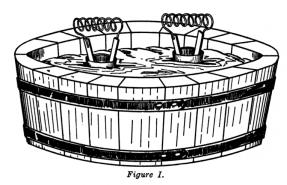
"The question is—what is going on in this space which will hold almost any weight of iron and yet has no effect upon human sensations? We don't know, but we think that it may be similar circles in the iron. Many years ago it was noted that coils (which are nothing but a number of hoops placed side by side and connected together), carrying current, attracted each other, and the following experiment to demonstrate this has been tried by innumerable investigators."
Mr. Ashpit here drew a sketch (Fig. I) on the pad, showing two batteries floating in a tub, the zinc and carbon of each connected by a coil.
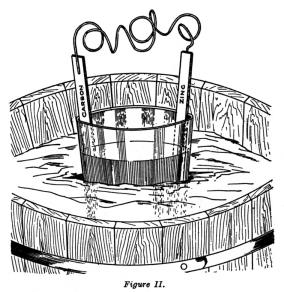
"Now, no matter what position you put these little coils they will always float back into the same position with reference to each other; that is, they will always come together end to end, and the same ends will always be adjacent. If, however, you should bend the spiral around like this (Fig. II) so that the various individual.circles face in all directions, then no movement of the floating battery would occur. This shows that when the circles face in various directions they neutralize each other; whereas, when arranged in a straight and orderly manner, one in front of the other, their forces are added to each other.
"For many years scientific men have thought that if electric currents traveling around in circles were present in iron it would account for the peculiar magnetic properties of this metal, but the difficulty lay in explaining the source of any such currents and why they should travel in a circle. Now, however, that the existence of electrons in the atom is practically proven the problem becomes somewhat more imaginable."
"Hold on there, Ashpit," breathed Menutt faintly. "I have tried to keep up with you so far, but that 'electrons in the atom' has me beat. What does that mean—and how was it proven?"
"Well, well, I thought you read the NEWS regularly—apparently you didn't see that alleged explanation of the repeater."
"Oh! You mean that story about the demons throwing marbles at the window blinds! Sure I read it. You mean to say, then, that the demons correspond to the atoms and the marbles are the electrons?"
"Exactly so, and if there were no such things as electrons, the telephone repeater wouldn't repeat.
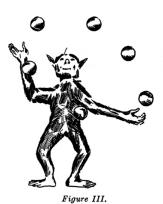
"Now, if every substance is made up of billions of atoms, and every atom has a pocketful of marbles or small balls, your imagination can work up almost anything. For example, as we know that the electrons are moving within or around the atom, why not imagine the demons in the case of iron to be expert jugglers like this. (Fig. III.) Whether electrons are electricity itself, or just balls of something else carrying charges of electricity, we don't know; but from the action of the repeater we think it must be one or the other; so you see, if there is a circle of revolving electrons in, or around, each atom like a juggler keeping six glass balls in the air, we have electricity traveling in circles, very small it is true, but still circles."
"Well, but—how can a ball of electricity be an electric current? Whoever saw a chunk of electricity, anyway?"
"Now, Menutt, I didn't say a chunk of electricity, I said the balls might be charged with electricity just like a condenser is charged. You can try it yourself. Tie a string around a subset condenser; charge it from the 110-volt direct current lighting circuit, and then swing it around a galvanometer or sensitive compass and see how the magnetic field created by this revolving charge of electricity will throw the compass needle one way or the other.
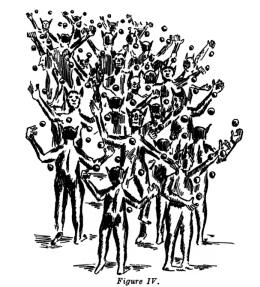
"Extremely sensitive measurements show that every substance is to some slight degree affected by the magnetic field, but iron, nickel, and cobalt are unique in their response to such stimulation, and one logical way of accounting for it would be to say that, while all demons could juggle some, the iron demons are some jugglers. That is, they can keep a much greater number of balls traveling in circles and at a much higher speed, than the demons in any other substance. Iron shows none of these properties, however, until placed under the influence of a magnetic field. In other words, the atoms are facing every which way and the various circles neutralize each other just the same as in Fig. II. The general idea is illustrated thus (Fig. IV), the atoms are all busy juggling the balls, but their work is wasted for lack of direction; like the Editorial Board without Mr. Newlywed. When, however, the demons are subjected to an external magnetic force they all line up as a battalion of soldiers, like this (Fig. V). You see here that you have the large coil carrying current and also the great number of atomic circles of current, and by the experiment of the little batteries in a tub of water you know that electricity traveling in a circle creates a condition within the circle known as a magnetic field, and that two such circles will attract each other; so the piece of iron represented by the regiment of demons is immediately drawn into the coil in the background of the picture. Have I answered your question?"
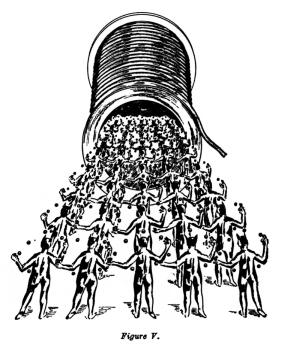
"I guess you have, Mr. Ashpit. I'm so dazed by the wonder of it all that I don't know whether you have or not. Why should the electrons on the iron atom revolve in circles when they don't in the case of brass or zinc?"
"Well, Menutt, all materials respond to some extent, and iron does not always respond; for example, if you heat a piece of iron up to 750 degrees the demons get hot and commence to throw their marbles instead of juggling them, and as a result the iron at this temperature becomes non-magnetic. Again, we don't know but what these little demons can be bred to juggle. A man by the name of Heusler prepared several different kinds of mixtures containing no iron whatever, and yet magnetic far beyond anything heretofore known except iron.
"You see, Menutt, the difference between iron and other things isn't so radical after all: it is mostly a matter of degree, and we don't know enough to be sure that other substances cannot be made magnetic."
"It certainly is a wonderful subject, Mr. Ashpit. Does Professor Rush study that sort of stuff all day?"
"Well, maybe not all day, but his regular work involves the frequent consideration of such matter."
"Oh, one thing more. This magnet I have has no coil around it, yet it draws a piece of iron. How is that?"
"Well, you see, Menutt, that magnet is made of steel. Now when you mix carbon in certain proportions with iron you form a substance known as steel, which has certain properties quite different from iron. For example, the carbon seems to paralyze the demons from the waist down under certain treatment.
"If you heat a piece of steel red hot and plunge it in water it becomes hard, which is only another way of saying that you cannot push the atoms around mechanically. This same treatment holds the atoms in whatever position they may be placed.
"Your little horseshoe is a piece of steel hardened and then magnetized by a very powerful electromagnet like the one in the receiver assembly department. While this electromagnet can pull all the demons around into line as in Fig. V, the demons themselves, on account of the hardened condition of the steel, have no power to break ranks."
"By Jove, that's immense. I want to apologize to you fellows, because I can see that a man doping out stuff like that all day gets a point of view which makes ordinary everyday life look pretty small. It just goes to show how little we know about each other. Now, I'm sure if you highbrows would come down out of the ether more often you would get so you could appreciate a little josh once in a while. How about it?
"In the meantime, let's have a round of grapejuice and sing the doxology."
So the four highbrows and the Philistine all stood up and, holding their glasses high, they joined in song as follows:
"Here's to the whole dang familee—
Engineer, sales and factoree.
Some of us like what others do not,
Even an accountant has a human spot.
Let them as wants, practice dignitee
If they take themselves so seriouslee;
But as for us, we're off that stuff—
Our creed is simple and for us enuff.
A little foolishness once in a while
Turns work into play and makes us smile,
And he who tackles his job with a grin
Is the happier man tho' maybe all in.
We all agree this is rotten verse,
But 'twas fun to write it—Good-night, Nurse."